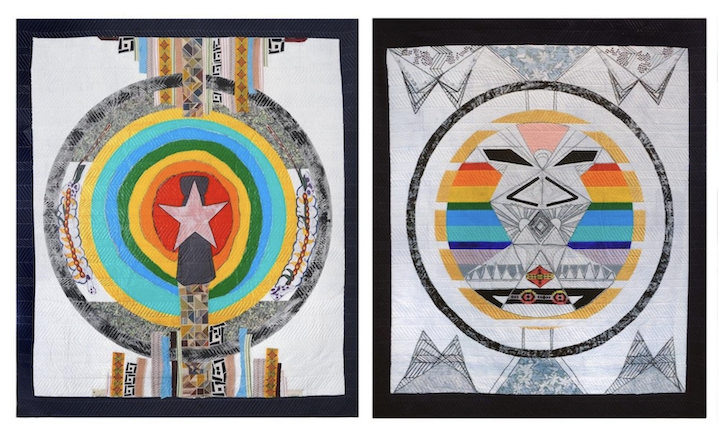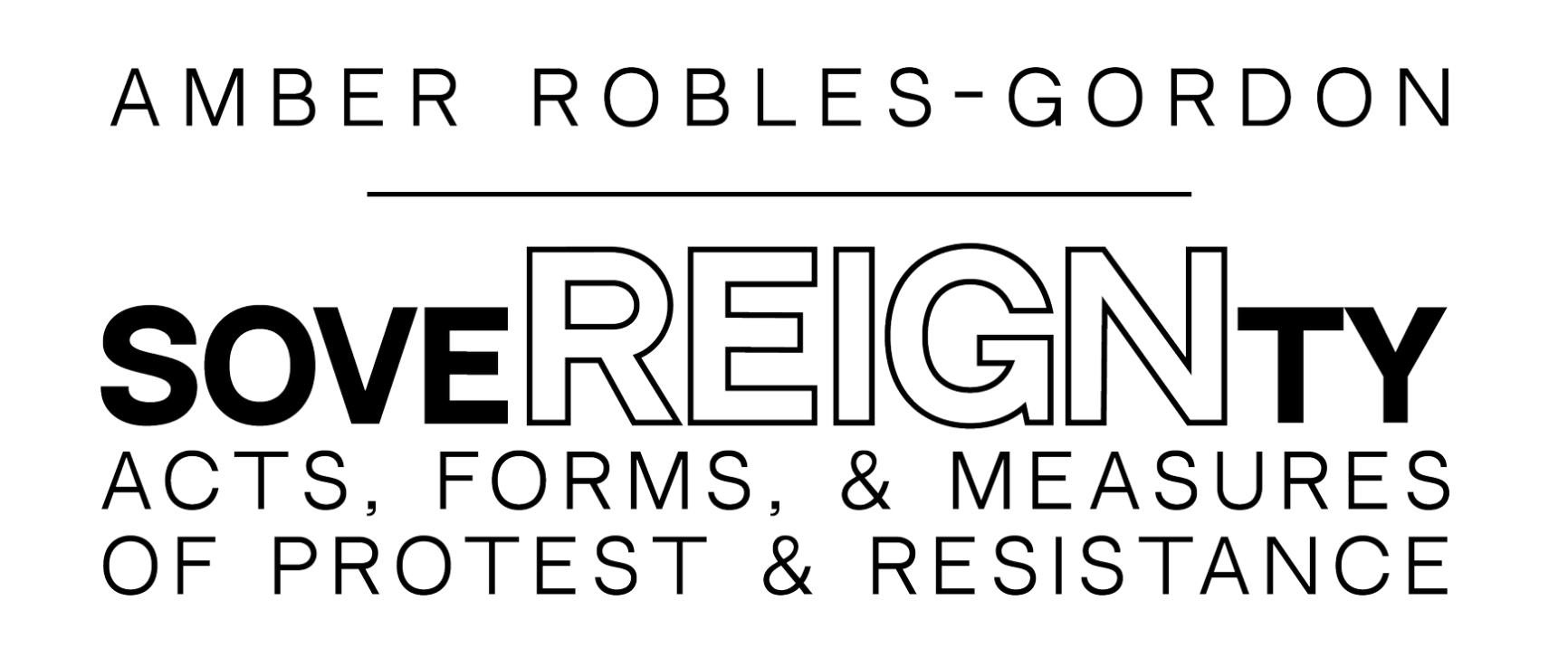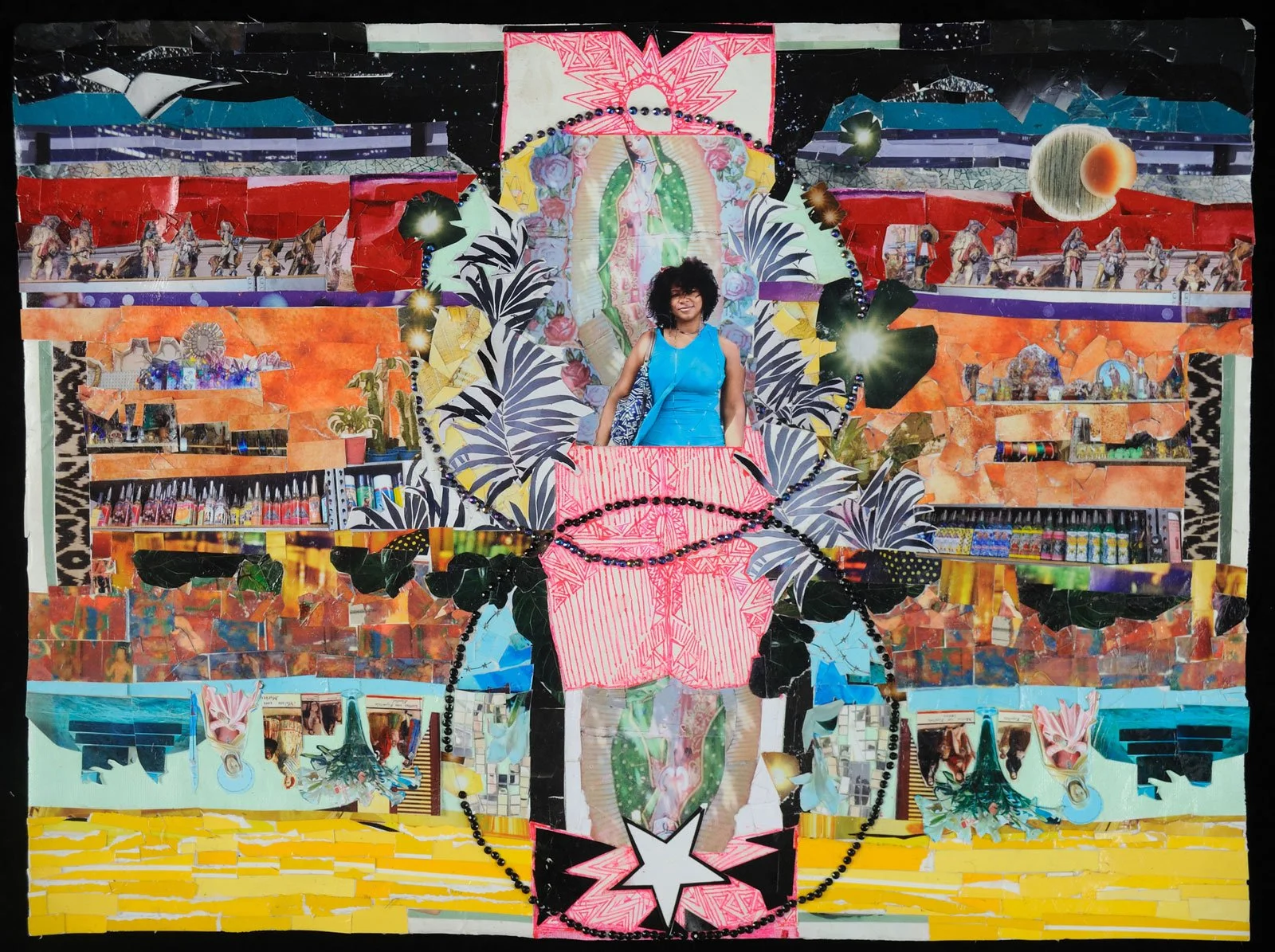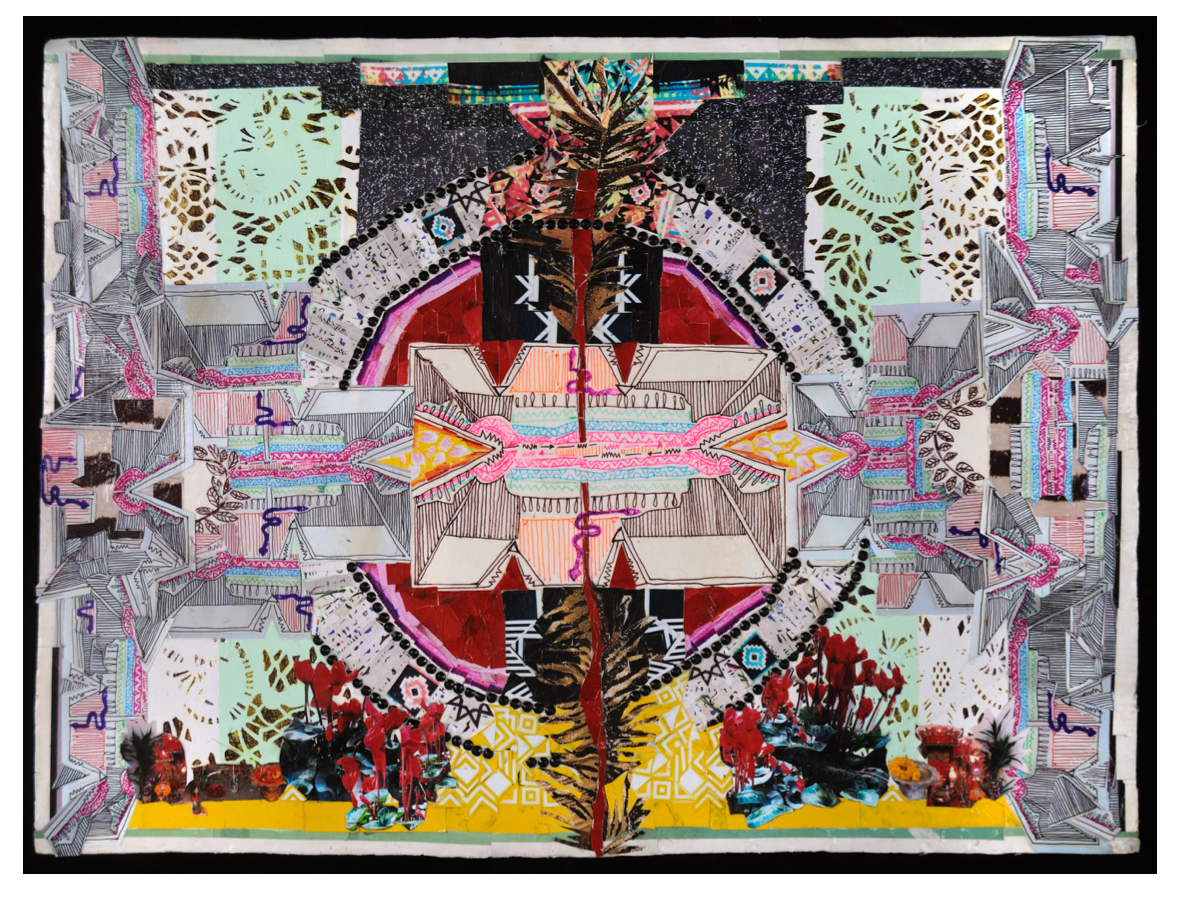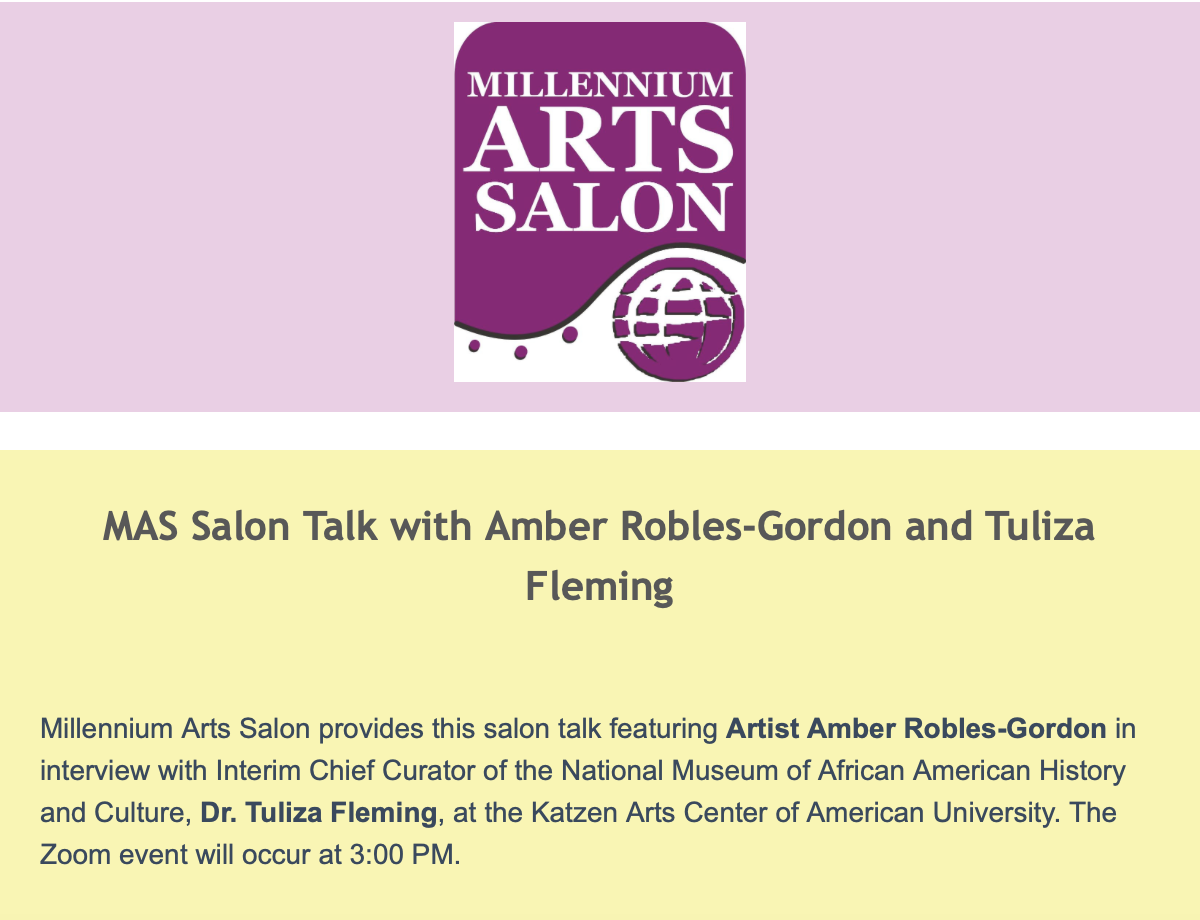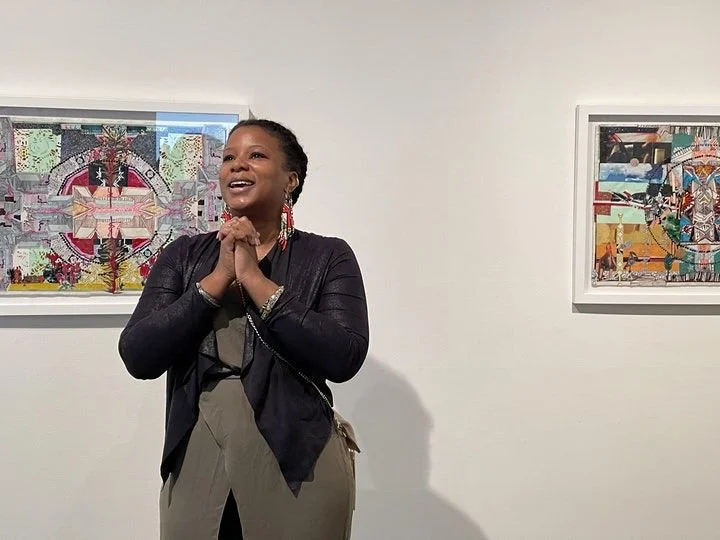Robles-Gordon is a multidisciplinary Afro-Latina artist based out of Washington, D.C., who was born in Puerto Rico, grew up in Arlington, Virginia, and has family living in the U.S. Virgin Islands, she said. The six double-sided quilts are meant to convey her perspective of these territories while deconstructing how they are affected by foreign and domestic policies and “stimulate further dialogue regarding the long arm of the American political machine.”
Read MoreUS Territories
SUCCESSIONS: Traversing U.S. Colonialism at Indiana State University Jan. 22 -Feb. 16
Amber Robles-Gordon
Amber Robles-Gordon’s Successions: Traversing U.S. Colonialism, are a series of abstract textile artworks that interrogate the past and current hegemonic domestic and foreign policies within its federal district of Washington, D.C., and its other five inhabited territories. It is through these works that the viewer is granted a pathway through discursive criticism around issues impacting marginalized communities.
Reception: Feb. 1, 4-6pm
Artist’s Talk: Feb. 1, 4:30pm Duration: Jan. 22- Feb. 16, 2024
Turman Gallery
Indiana State University
Fine Arts Building
649 Chestnut Street Terre Haute, IN 47809
GALLERY HOURS:
M-F 11am - 4pm
All gallery events are free and open to the public.
The first edition of "Successions: Traversing US Colonialism"was held at the American University Museum at the Katzen Arts Center in fall 2021. The exhibition was curated by Larry Ossei-Mensah.
https://www.american.edu/cas/museum/2021/successions.cfm
https://www.amberroblesgordon.com/successions-traversing-us-colonialism
Dr. Kelli Morgan, Curator and Visual Artist, Amber Robles-Gordon in Conversation

"These amazing and accomplished thinkers will be engaging in a discussion about the impressive visual presentation and critical investigations present Amber’s current exhibition on view at our gallery: soveREIGNty: Acts, Forms, & Measures of Protest & Resistance."
Read MoreFEATURED
Crawl Space: July 2022
FEATURED
July’s First Saturday events will feature extended exhibitions worth a second look
JUN 30, 2022
Northern Mariana Islands, Political, Spiritual,
Tinney Contemporary will be sticking with its June show through July 9. I reviewed Amber Robles-Gordon’s Sovereignty exhibition for the Scene — it’s a prime example of how artists can incorporate political and social content into a body of work while also making art that’s formally striking. We’ve seen lots of messaging about social and political issues in the contemporary art of the 21st century. However, much of that work will never be remembered or reconsidered — timely art is rarely timeless. Robles-Gordon’s work is visually successful irrespective of its critiques of the U.S. policy toward — and governance of — its populated territories and the District of Columbia. I’ve seen powerful political art and dim political art, and I often question whether visual art is an effective medium for political messages. But the work in Sovereignty is formally distinctive. Tinney Contemporary will be open this Saturday from 2 to 8 p.m.
https://www.nashvillescene.com/arts_culture/visualart/crawl-space-july-2022/article_4d18f0c8-f6e7-11ec-a1b5-8f437edaf809.html
Tinney Contemporary Presents
This exhibition features Amber Robles-Gordon’s large-scale, mixed-media quilts–assemblages incorporating paint, textiles and hand-stitching–in an interrogation of U.S. policy towards–and governance of–its populated territories and the District of Columbia.
Read MoreAmber Robles-Gordon’s anti-colonial quilts and personal histories at American University Museum at the Katzen Center
“y mi bandera vuela mas alto que la tuya,” 2020. Mixed media collage on canvas, 18 x 24 in. Courtesy of the artist.
By Andrea KirshDecember 17, 2021
An artist’s visit to her mother’s birth place in Puerto Rico awakens her to the complexities of immigration and family – and to the dubious socio-political actions and inactions, by the U.S. government in its far-flung territories. Our reviewer Andrea Kirsh is moved by the powerful collage works and double-sided quilts of Amber Robles-Gordon. The show closed Dec. 12.
Amber Robles-Gordon‘s first grade classmates in Arlington, VA bullied her for speaking Spanish, so she learned to speak to her mother in English. It wouldn’t be until middle age that the artist finally visited her mother’s birthplace in Puerto Rico. Successions: Traversing U.S. Colonialism, her solo exhibition at the the American University Museum at the Katzen Center (August 28 – Dec. 12, 2021) in Washington, D.C. was the product of that initial trip and a her return for a six-week residence on the island in 2020.
The exhibition presented two bodies of work. The first, “Place of Breath and Birth” is a series of ten vibrant collages on canvas, all 18 x 24 inches; two, represented by full-scale pigment prints. The collages are constructed from masses of tiny images cut from paper; even the bands of color that form their backgrounds are assembled from minute, colored fragments. And there is a very personal rhythm – like distinctive brushwork – in the way Robles-Gordon arranges the fragments.
Another personal language of Robles-Gordon’s appearing in the fragments is inspired by multiple, non-Western cultural traditions and imagery taken from magazines and photographs. These fragments are used as structuring and framing elements, incorporating the artist’s drawings of detailed and decorative, spiky, geometric patterns. An occasional small trinket or charm adds surface texture, as does the profusion of tiny, sparkly beads which outline the central, circular forms on each collage. The beads and high-keyed colors capture the intense sunlight of the Caribbean and lend a festival-like quality to the series.
Robles-Gordon culls her imagery from photographs she took in Puerto Rico or found elsewhere that evoke its lush, intensely-polychromed environment – both natural and human. While on the island, she was fascinated by the rubber trees and palms, the coconuts and mangos, street murals and public art. The titles of individual collages suggest the range of topics that were prompted by her visits: “Observation of Influencers: Taino culture and heritage, the climate and machismo,” “For bioluminescent bays and turtles.”
Her long-time interest in spirituality and syncretic, New World religious practices inspire aspects of the collages’ format, which the artist likens to personal altars. The imagery of fruit and floral offerings, flickering candles and the crystalline forms of her drawing run throughout the series and reinforce their spiritual associations. She includes photos of herself – both earlier and contemporary images – in several collages, and there is no question that the series itself is a diary of self-discovery.
“Reflexiones sobre el yo, la virgen maría y el colonialismo,” 2020. Mixed media, collage on canvas, 18 x 24 in. Courtesy of the artist.
Quilts of pointed anti-colonial critique
If the collages capture Robles-Gordon’s connection to her ancestral culture in the form of personal, spiritual reflection, the second part of the exhibition responded to her developing political understanding of Puerto Rico’s position as a U.S. Territory. The works are a public forum in which to teach, to encourage discussion, to heal, and to begin building a congregation of territorial residents. Six, large, double sided, appliqued quilts hung throughout the high-ceilinged gallery. The installation, which gave its name to the exhibition, was titled “Successions; Traversing U.S. Colonialism.” The quilts include dense references to histories that have yet to be acknowledged and the dark underside of U.S. power. Their format entangles the conventionalized emblems of history and patriotism with the domestic craft of quilting, the masculine pursuit of territory and power with a feminine tradition of healing.
On one side of each quilt Robles-Gordon addresses political history, with references to each of the U.S. Territory’s flag or seal, as well as to the exploitation of its indigenous people for medical experimentation, military support and economic interests; on the other side she constructs an altar dedicated to healing the damage of historical exploitation and the racism which underpins it. Both sides bear central medallions; they are greatly enlarged versions of the circles in the collages, and make references to the circle as a foundational religious image and form of celebration – to healing circles and ceremonial dancing. The healing altars are constructed with the same spiky, geometric patterning that Robles-Gordon used in the collages, and all have hieratic, symmetrical designs. Here they suggest abstracted figures of deities, and their patterning makes reference to a variety of Afro-diasporic and non-Western decorative histories seen in painting, textiles and ceramics. Although painted, they appear to be drawings in chalk on black backgrounds, which suggests religious images in various cultures which are intended to be temporary.
The timing of Robles-Gordon’s residency in Puerto Rico reinforced her understanding of the disparity between U.S. government support to the island after the overwhelming damage from Hurricanes Maria and Irma in 2017, and the level of disaster relief Americans have come to expect on the mainland. This understanding, in turn, led to her interest in the U.S. Territories as a group; areas under United States dominion with the highest percentage of poverty, where the government has exploited resources and sited strategic military bases, with little concern for the inhabitants – all people of color, who are largely, only nominally U.S. Citizens. The territories function, rather, as U.S. colonies.
Puerto Rico, Guam, American Samoa, the Virgin Islands, and the Northern Mariana Islands are unfamiliar to many on the mainland United States. Few Americans know that their residents are U.S. Citizens with the right to vote – although they lack full representation in Congress. Robles-Gordon included Washington, D.C., her current home, among the territories because it’s residents, too, fall under U.S. jurisdiction but have no fully-empowered Congressional representative.
Robles-Gordon used her childhood bullying as a spur to understanding her own cultural traditions, and it is characteristic of her long-developed career of teaching and producing art that she didn’t respond to the history of territorial exploitation with rage, but with honesty, offering understanding, teaching and healing as a foundation on which to advocate for social justice in the outlying regions of the United States and in powerless communities internationally. The sense of spirituality and turning towards a better future pervades her work as much as her personally-developed language of forms and patterns, use of repurposed materials, passionate polychrome, and fusion of visual traditions.
Amber Robles-Gordon, “Successions: Traversing U.S. Colonialism” is now closed. It was on view at the American University Museum at the Katzen Center in Washington, D.C., August 28–December 12, 2021.
“The eternal altar for the women forsaken and souls relinquished. Yet the choice must always remain hers/ El altar eterno de las mujeres abandonadas y las almas renunciadas. Sin embargo, la elección siempre debe ser de ella.,” 2020. Mixed media collage on canvas, 18 x 24 in. Courtesy of the artist.
Bmore Art
People, food, and horticulture are among the things that move. Amber Robles-Gordon’s use of the Ficus Elastica is part of the symbology that reverberates throughout her exhibition, Successions: Traversing US Colonialism, on view at the American University Museum at the Katzen Arts Center in Washington, DC, through December 12, 2021. The Ficus Elastica—colloquially known as the rubber tree—has its roots in South Asia, though it was later nativized in the West Indies through the rubber trade. Dear reader, among your houseplants you are likely to find the genus of the rubber plant.
Read MoreMuseums Review In the galleries: Artist’s works criss-cross the paths of U.S. colonialism
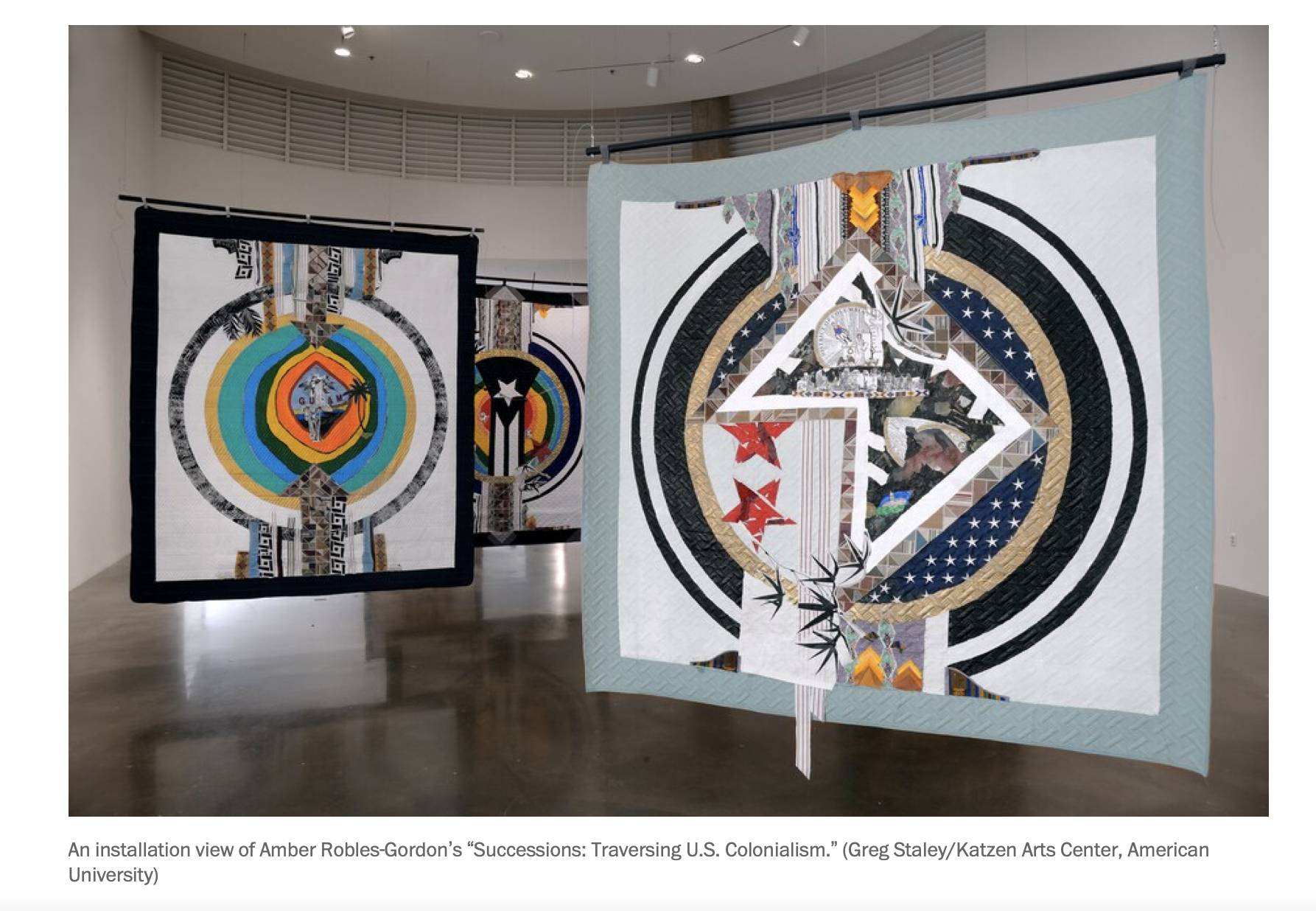
Residents of D.C. are used to seeing the place as an almost-state, much like Maryland or Wyoming, yet not quite. Amber Robles-Gordon, a longtime Washingtonian who was born in Puerto Rico, has a different take. Her American University Museum show, “Successions: Traversing U.S. Colonialism,” groups D.C. with her birthplace and four other inhabited territories: Guam, the U.S. Virgin Islands, American Samoa and the Northern Mariana Islands. She represents these disenfranchised territories on two-sided quilted banners, one face for “political” and the other for “spiritual.”
Read MoreSuccessions: Traversing US Colonialism Listed on BmoreArt’s Picks: November 2-8
This Week: John Oliver’s hand-picked AVAM exhibition, A Passion for Collecting: The Vision of Louis Allan Ford at Galerie Myrtis, Zoë Charlton in conversation presented by Cade Gallery, Bridget Z. Sullivan at Hamilton Gallery, Jonna McKone/Keep A-Knockin’/Noah Breuer/Solo Lab 5 opening at VisArts, Amber Robles-Gordon at the Katzen Art Center, Katie Pumphrey: Night Swim at Project 1628, The Guardians presented by the Peale at Carroll Mansion, and more … plus Maryland Art Place UNDER $500 2021 and other featured calls for entry.
Read MoreAmber Robles-Gordon's Artwork Navigates US Colonialism for its Colonies, including DC
About this event
Millennium Arts Salon provides this salon talk featuring Artist Amber Robles-Gordon in interview with Interim Chief Curator of the National Museum of African American History and Culture, Dr. Tuliza Fleming, at the Katzen Arts Center of American University. Ms. Robles-Gordon, who was born in Puerto Rico, and raised in the DC area, examines the role of the United States as a colonial power with both Puerto Rico and the District of Columbia as two such colonies, with intimations of paternalism, tyranny, and containment of citizen aspiration attendant thereto. Dr. Fleming as scholar, will guide our better understanding of Amber's magnum opus, as she explores the underpinnings of the artwork from conceptualization to execution.
Millennium Arts Salon honors our relationship with the Katzen Arts Center in bringing programs of importance to our joint and several audiences in their beautiful and monumental space.
The MAS Salon Talk will be delivered over Zoom. Please register via the Eventbrite ticket engine and an email of the Zoom link will be sent to you before the event.
Please join us Saturday November 13 at 3:00 pm
Artfully yours,
The Board of Directors of Millennium Arts Salon
Successions: Traversing US Colonialism Amber Robles-Gordon
August 28–December 12, 2021
American University Museum Curated by
at the Katzen Arts Center Larry Ossei-Mensah
Amber Robles-Gordon presents Successions: Traversing US Colonial- ism, a solo exhibition on view at the American University Museum at the Katzen Arts Center in fall 2021. Successions is a conceptual juxta- position that celebrates abstraction as an art form while leveraging it as a tool to interrogate past and current US policies within its federal district (Washington, DC) and territories (including Guam, Puerto Rico, and the US Virgin Islands) that it controls. By highlighting nuances relat- ed to US governance in its federal districts and territories, Robles-Gor- don seeks to question who has access to resources, citizenship, and the right to sovereignty.
y mi bandera vuela mas alto que la tuya., Mixed Media Collage on Canvas, 18 x 24 in., 2020
Robles-Gordon creates artwork imbued with a layered visual language replete with cultural signifiers and abstract gestures. Successions is a celebration of abstraction as an artistic expression. Robles-Gordon uti- lizes iconic artists like Robert Rauschenberg, Alma Thomas, Romare Bearden, and members of the Washington Color School as vivid refer- ence points for her own dynamic use of color, form, and material within the works she created for the exhibition. These explorations will provide insights into a number of inquiries that undergird the construction of the exhibition. Successions creates a pathway towards discursive crit- icism around issues impacting marginalized communities oppressed by the United States’ hegemonic domestic and foreign policies. The exhibition features a new body of colorful abstract paintings, collages, and quilts created in 2020 and 2021 between San Juan, Puerto Rico (Robles-Gordon’s birthplace) and Washington, DC (where she current- ly lives).
USVI Political, Detail, Front, Mixed Media on Quilt, 86 in. x 90 in., in., 2021
During the height of the COVID-19 pandemic, Robles-Gordon’s creative strategies were directly impacted as a result of sheltering in place in San Juan. The lack of access to materials and arduous circumstances she was confronted with in Puerto Rico and upon returning to Washington, DC catalyzed Robles-Gordon to impro- vise her approach to making works for the exhibition. Moreover, the ex- perience heightened her awareness of how communities on the margin are adversely treated during mo- ments of crisis.
Robles-Gordon’s also uses works featured in Successions to mine the stories, personal narratives, and aesthetics of the women of the Caribbean, particularly of African de- scent, in an effort to investigate the political, socio-economic, and envi- ronmental implications of placemaking, contemporary colonial policy, and notions of citizenship on these social groups. The debate over DC statehood, similar to Puerto Rico, has been a prevalent point of con- tention in the District but rarely featured in the national conversation. Robles-Gordon seeks to use her “backyard” as a metaphor that would
expand our understanding of notions of freedom, liberty, and justice.
A fully illustrated catalog with essays by Ossei-Mensah and Noel Anderson and in-person and virtual programs will accompany the exhibi- tion, enriching the viewer’s experience.

